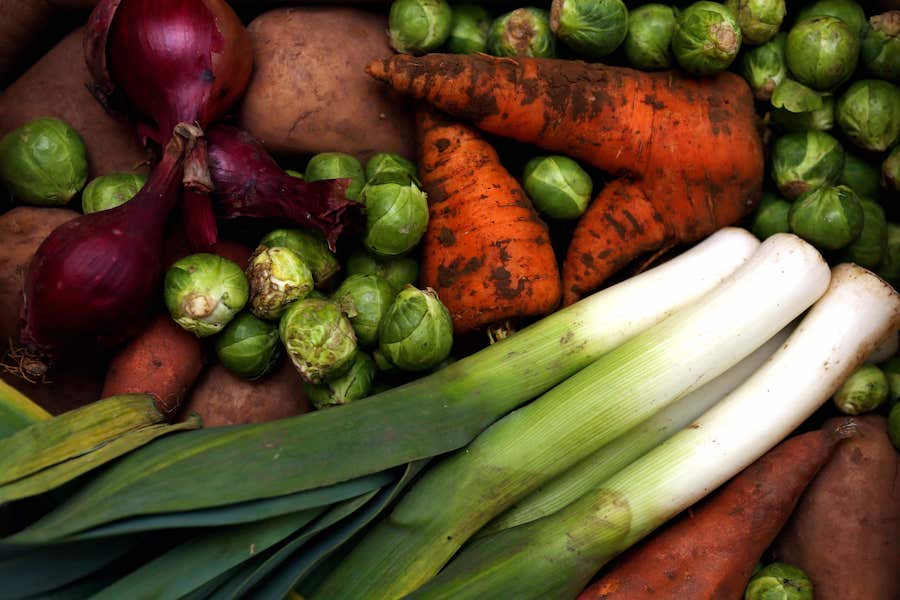Plant-based diets may be linked to lower cholesterol levels – study
Eating a vegetarian or vegan diet from an early age could reduce the risk of heart disease caused by blocked arteries, researchers suggest
Vegetarian and vegan diets may be linked to lower levels of cholesterol and fats in your blood, a new study suggests.
Researchers say their findings, which analysed evidence from studies published since 1982, suggest plant-based diets can play a significant role in reducing blocked arteries.
This would mean reducing the risk of heart and blood vessel diseases, such as stroke and heart attacks.
According to the researchers, eating a vegetarian or vegan diet from an early age could potentially reduce the risk of heart disease caused by blocked arteries.
The study found that vegetarian and vegan diets were associated with a 14% reduction in all proteins that clog arteries.
This corresponded to a third of the effect of taking cholesterol-lowering medications such as statins, the researchers found.
Professor Ruth Frikke-Schmidt, chief physician at the Rigshospitalet in Copenhagen, Denmark, conducted the study together with medical student Caroline Amalie Koch and Dr Emilie Westerlin Kjeldsen, also from the Rigshospitalet.
She said: “We found that vegetarian and vegan diets were associated with a 14% reduction in all artery-clogging lipoproteins as indicated by apoliprotein B (apoB).
“This corresponds to a third of the effect of taking cholesterol-lowering medications such as statins, and would result in a 7% reduction in the risk of cardiovascular disease in someone who maintained a plant-based diet for five years.
“Statin treatment is superior to plant-based diets in reducing fats and cholesterol levels.
“However, one regimen does not exclude the other, and combining statins with plant-based diets is likely to have a synergistic effect, resulting in an even larger beneficial effect.
“If people start eating vegetarian or vegan diets from an early age, the potential for reducing the risk of cardiovascular disease caused by blocked arteries is substantial.
“Importantly, we found similar results across continents, ages, different ranges of body mass index, and among people in different states of health.”
The researchers looked at 30 trials with a total of 2,372 people, published between 1982 and 2022.
They assessed the effect of vegetarian or vegan diets versus omnivorous diets on levels of all types of cholesterol, bad cholesterol, triglycerides – a type of fat found in the blood, and apoliprotein B – a protein that helps to carry fat and cholesterol in blood.
No similar studies have been published since 2017, and the researchers say none have addressed the impact of continent, age, body mass index, and health status, or looked specifically at the effect of diet on concentrations of apoB.
The people in the studies either followed a vegetarian or vegan diet, or continued with an omnivorous diet (which includes meat and dairy products).
The length of time on the diets ranged from 10 days to five years, with an average of 29 weeks.
According to the findings, compared with people eating an omnivorous diet, those who followed a plant-based diet experienced an average reduction in total cholesterol levels of 7% from levels measured at the start of the studies.
There was also a 10% reduction in bad cholesterol levels and a 14% reduction in apoB levels, the study published in the European Heart Journal found.
Prof Frikke-Schmidt said: “We saw significant effects from both vegetarian and vegan diets and people ranging from a normal weight to obese.”
She added: “Our study provides robust evidence that plant-based diets are good for our health for people of different sizes, ages and health conditions.
“Furthermore, populations globally are aging and, as a consequence, the cost of treating age-related diseases such as atherosclerotic cardiovascular disease is increasing.
“Plant-based diets are key instruments for changing food production to more environmentally sustainable forms, while at the same time reducing the burden of cardiovascular disease.
“We should be eating a varied, plant-rich diet, not too much, and quenching our thirst with water.”
Dr Duane Mellor, registered dietitian and senior lecturer, Aston Medical School, Aston University, said: “If someone is thinking about making a dietary change, it can be useful to discuss these with a health professional and perhaps a dietitian so that it is designed to be nutritionally adequate, help address their health concern and ideally be enjoyable.”
Tracy Parker, senior dietitian at the British Heart Foundation (BHF), said: “This study only looked at people eating strict vegan and vegetarian diets over a short period of time, and some people can find it hard to consistently follow these diets long-term.
“Some may find it easier to follow a Mediterranean-style diet that features plenty of fruit, vegetables, pulses, wholegrains, fish, eggs and low fat dairy, with only small amounts of meat.
“If you want to make healthy changes to your diet, a great place to start is the Eatwell guide, which is the basis for our healthy eating recommendations in the UK.”
The Press Association
Latest posts by The Press Association (see all)
- Actor Richard Chamberlain dies aged 90 - March 30, 2025
- 5 new books to read this week - March 26, 2025
- 6 things a physio wishes people over 60 would stop doing - March 25, 2025
- NHS reminder to 7.5m people as Covid-19 jab booking system opens - March 25, 2025
- The truth about cholesterol – what you need to know - March 25, 2025




















